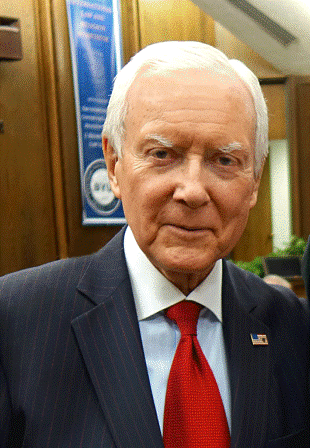Symposium 2014: Keynote Speaker Orrin Hatch

Participants at the October 5, 2014 opening session of the 21st Annual International Law and Religion Symposium were pleased to hear a Keynote Address from Senator Orrin Hatch (R-Utah). Also at the opening session, held in the Moot Court Room of the J. Reuben Clark Law School on the campus of Brigham Young University in Provo, Utah, Professor W. Cole Durham, Jr., Director of the Symposium’s sponsoring organization, the International Center for Law and Religion Studies, presented the Center’s Distinguished Service Award to Senator Hatch.
In commenting upon the selection of Senator Hatch as a recipient of the award, BYU Law School Associate Dean and ICLRS Associate Director Brett G. Scharffs said, “Over his lengthy career, Senator Hatch has been a consistent and articulate defender of religious freedom. From his work on the Religious Freedom Restoration Act, which is the most important legislation in the last half century dealing with freedom of religion, to his work on the International Religious Freedom Act, to name just two, Senator Hatch has been at the forefront of issues relating to freedom of conscience, religion, and belief.” As Center Associate Director Professor Gary B. Doxey observed, “Senator Hatch has played a truly significant role – perhaps the leading role – in shaping religious freedom legislation in America.”
Orrin Hatch assumed office in the United States Senate on January 3, 1977. Now in his seventh term, he is the most senior Republican in the Senate. His tenure has been marked by decades of influence over legislation in the United States. He was for twelve years chairman or ranking minority member of the powerful Senate Judiciary Committee, which helps shape the federal judiciary and has a direct impact on such issues as civil rights, immigration, antitrust and consumer protection, and issues related to the Constitution. Senator Hatch also served as chairman of the Health, Education, Labor and Pensions Committee. He currently serves on the Board of Directors for the United States Holocaust Memorial Museum and as ranking minority member of the Senate Committee on Finance, the committee responsible for overseeing 60 percent of the federal budget, including Medicare, Medicaid, and Social Security, as well as all tax policy and international trade agreements.
As mentioned by Dean Scharffs, notable among Senator Hatch’s prestigious achievements was his work as a critical force in garnering bipartisan support for the Religious Freedom Restoration Act (RFRA), which was passed by overwhelming majorities in both houses of Congress and was signed into law by President Bill Clinton in 1993. RFRA was enacted to ensure that governments should not substantially burden religious exercise without compelling justification. Seven years later Senator Hatch was the principal author of the Religious Land Use and Institutionalized Persons Act (RLUIPA), enacted unanimously by both houses of Congress in 2000. RLUIPA protects all religions’ rights to build church facilities on public property, as well as protecting the religious rights of incarcerated individuals from severe burdens.
The Center is honored to present its highest award to Senator Hatch in acknowledgment of his service in the cause of religious freedom.